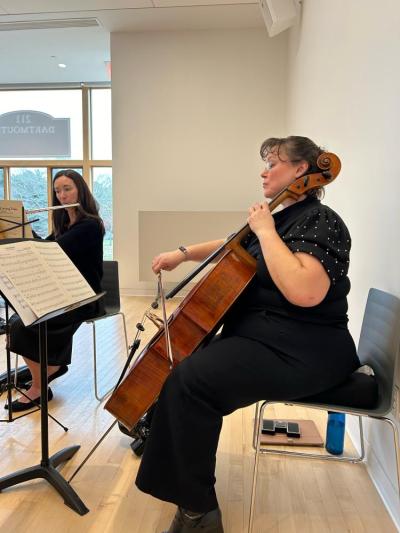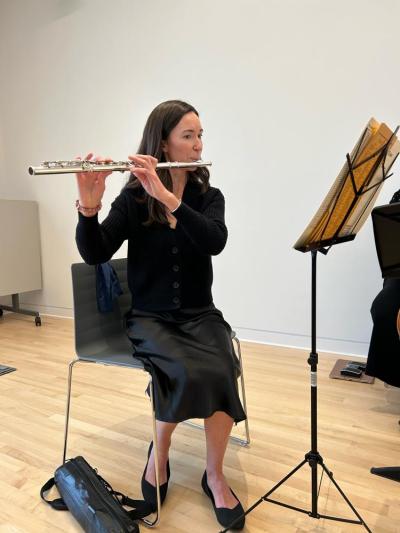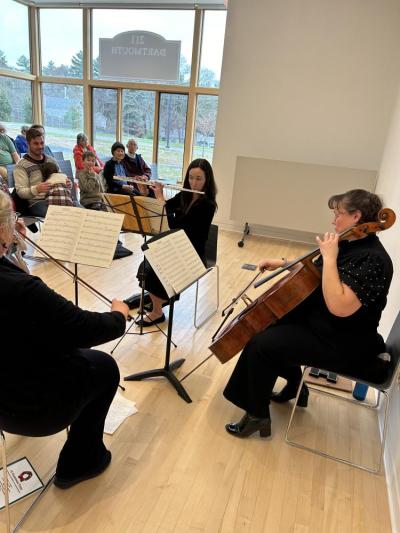Symphonic holiday favorites come to North Branch Library
It’s not often a symphony performance becomes a sing-along show. But on Saturday, Dec. 9, the audience at the North Branch Library sang along as musicians of the New Bedford Symphony Orchestra performed classical versions of popular holiday carols, such as Silent Night, O Christmas Tree and We Wish You a Merry Christmas.
The free event featured musicians Caitlyn Schmidt, Elisa Birdseye and Eleanor Blake who played the flute, viola and cello respectively.
The three also played music from Spanish, German and French composers. Between songs, Birdseye provided historical context about music written during pivotal moments in American history such as the Civil War, American Independence and World War 1.
A self-described “history nut,” Birdseye explained that composers are woven into the fabric of history, and that you can’t really appreciate classical music without learning about the composers who wrote it.
Between songs, the three musicians took time to tune their instruments that are highly sensitive to minute changes in temperature and humidity.
Playing in a hot theater and then walking the instrument to the car through a chilly parking lot is enough to throw a cello out of tune. The holidays are a hectic time for musicians who hustle from venue to venue, organizing their solo gigs around their usual orchestra season that runs from September to May.
Being a musician is more physically demanding that most people realize. As a child, Blake wanted to play the violin, but doing so hurt her neck. After a few visits to the chiropractor, she put her violin dreams aside and specialized in the cello instead. During the Saturday performance, Blake’s arms, legs, fingers and cello all swayed together in sequence.
“It just fits me better,” Blake said of playing the cello.
Each instrument takes its own toll on the body. Clarinetists have callouses on the insides of their lips and people who play string instruments have sore, split fingers. As a rule, musicians are very careful with their hands.
A long performance can a be a grueling experience.
“Musicians are not taught to think of themselves as athletes, but there are a lot of physical components to it,” Birdseye said. “Look at a brass player after a concert, their lips are practically bloody.”
But playing music is as mental as it is physical, and mindfulness plays an important role in a performance. After years of playing an instrument, muscle memory kicks in and the mind can easily wander during a concert. Birdseye said it’s important to stay focused and resist that mind’s impulse to check into autopilot.
“You have to pull it back,” she said. “You need to keep your mind coming back to what’s right in front of you.”
Performing is like walking a high-wire, Birdseye said. There’s the stress that something could go wrong. But rather than fight that fear, Schmidt, who plays the flute, said she uses the stage fright to fuel her performance.
“Try not to stop it,” Schmidt said. “Just go with it. Use it. Use it as adrenaline.”
Even still, mistakes happen and not every note is perfect. But dwelling on those little mistakes can hurt the rest of the performance.
As a music teacher, Blake encourages her students to not be too hard on themselves.
“I tell my students, ‘If you counted all the notes in that piece, I’m sure you played most of them right. So why are you focused on the one or two that went wrong?’”
Much like a play, every live concert is different that the last, each filled with their special moments shared between the audience and performers. Sometimes, those little mistakes are what make a performance special.
“You can’t be too self-critical,” Birdseye said. “You just need to trust that your training and muscle memory are there. Perfection is not necessarily the goal. You want something that has feeling and heart.”
The audience is as important as the performers, and at no time was that more apparent than during the pandemic, when the socially distanced musicians recorded their concerts in an empty theater.
Not only did the masks and special precautions make it difficult to breathe and impair the acoustics, one trumpet player was surrounded by plexiglass, but it felt strange performing without an audience.
A good performance communicates something to the audience, Birdseye said, but that’s hard to do when the seats are all empty.
“There’s a pressure of energy that comes from the audience,” Birdseye said. “You can’t really see them because the lights are in your face, but you can feel them. … I remember when the audience came back, how great that felt.”















